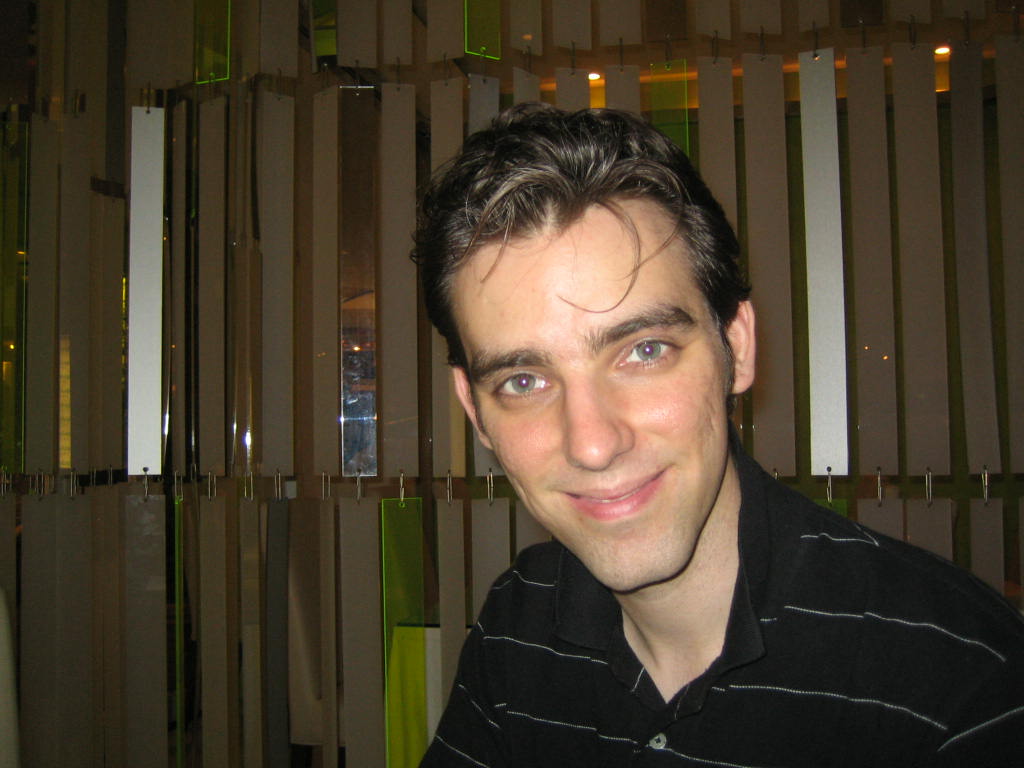penguin kingLife taught me that the first crack of feebleness/anger can be assigned to the very moment the debater begins to contort facts. To exemplify the matter, let us consider a certain line of yours:
"I would gladly stand up except that you say that there is no God."Now, dear sir - I have scanned my messages and couldn't find any trace for such a saying. Truth to tell, I know not whether there is or there isn't any god/s. That is what distinguishes between you and me: I
admit my ignorance, my lack of knowledge regarding the complete truth behind the fascinating scenes of nature - you, on the other hand, embrace an "easy answer" (i.e. a particular religion among thousands), without the need for research.
I said there is no afterlife? -When did I say it? -What I say is:
we don't know what happens when we die; so why the hell should we take the chance? -because our forefathers believed self-survial is secured? -Because they wrote it in tomes and declared it holy?-Hurray! how re-assuring. Note that such forefathers also believed the earth to be round, among other nonsense.
See bottom of this post: I pasted a few passages from my book. Perhaps you'll find some to your intellectual liking.
"Im not afraid of death. Mortallity in my opinion is a gift. "Penguin, do bear in mind that you have come to a liberal place. One of the core principles of our movement is not just the aspiration for the freedom of life, but the
freedom of death as well. So to speak, if your personal belief states that death is an essential part of your supposed 'cycle of existence' or something, we will respect it. Enjoy the ride.
We believe people have (or more precisely for the present state -->
should have) a full right for life, as for death. We demand the same deal: respect us, by allowing us to live and dream as we see fit. It works both ways, you see.
Oh, and about Kohelet's poetry - - isn't it just fabulous?

One of my very favorites. Especially when its read in my native tongue (Hebrew).
So why did Kohelet emphasize 'a time to die'? -perhaps on account of sheer frustration? -Look out for my essay, "Kohelet: The Immortalist of the Holy Bible", has to be somewhere around.
Yours truthfully,
-Daniel S.
------
From an objective point of view, the true nature of post-death existence is, without a doubt, unknown. No one, thus far, has ever come back from the dead to satisfy our eager and most-curious minds by supplying the answers that truly matter. No one, so far, has ever demonstrated a valid, identifiable transition from an alleged existence-plane of the spiritual sort to the physical one we are all a part of.
While numerous mystics would have surely begged to differ, they nonetheless lack sufficient evidence to support any of their spectacular claims. Furthermore, the worldwide numerousity of religious and mystical creeds and their evident diversity significantly diminish their credibility and accordingly strengthen their fallibly. This point is highly important; suppose one particular creed is correct, retaining a true miraculous or divine element - how could one tell it apart from the rest? –All creeds purport to retain such element while revoking their contenders' claims. Due to the lack of impartial proof, or more precisely – the lack of physical means to attain such proof, it is quite impossible to tell creeds apart; most if not all seem to rely on subjective interpretation while basing their dogma on so-called "ancient wisdom". It has not been said in vain that everyone is going to hell and/or will be extinct in other people's religion; nothing could be closer to the truth.
So how can a believer guarantee his survival and permanence? –Surely he cannot simultaneously appease the entirety of demands presented by the various different faiths all around the world. The ancient Egyptian sages, for instance, believed that in order to reap the fruits of the afterlife, one's deceased body has to be properly mummified according to strict guidelines lest the "Ba" (component of the human soul) will be damned to roam around for all eternity. In addition, many rituals were designed to ensure a favorable judgment by Osiris (god of the underworld) and were written in the papyrus or linen called "Book of the Dead."
Who can possibly refute or verify such claims? –And yet generations of Egyptian kings literally devoted their lives to their faiths, putting tremendous efforts by following the strict dogma of their fascinating religion; all had been carried out for one cause: to ensure the prospect of post-death survival of the spiritual sort. Can one show us that the Pharaohs who built the finest tombs, collected the most elaborate funerary equipment, and were mummified in the most expensive way – are not currently residing in the fields of Aaru for a blissful eternity?
The bottom line of our present discussion is that the variety of the known "paths to salvation" is simply too vast. This gives rise to an interesting question: do the faithful value their lives enough to have them placed on a bet? –Or is it simply because they have no choice; death is sure, and for that - choosing a certain path is vital. But such choice does come with a heavy price: the need for convincing oneself in the uncompromising genuineness and reliability of one's own belief: my path is the right path, despite other believers' inconsistent claims and beliefs, despite the lack of conclusive evidence to prove the trustworthiness of my own chosen path and to distinguish it from its equals. In terms of ambiguity all survival creeds stand equal; surely it is impossible to indicate an objective advantage to a particular doctrine. Can one demonstrate that the probability of reaching the Christian heaven is greater than that of being devoured by the Egyptian demon Ammit?
There is nothing on earth that could possibly prove the existence of heaven, hell, or any other sort of desirable or undesirable post-death world; the same applies to the reincarnation creeds*. On the other hand, there is plenty of evidence confirming that people will eventually die; that our physical life here on this beautiful place, our definite form of existence as we know it - is bound to expire at a certain time. No more is known for certain, and no less. And yet generations upon generations of men have zealously argued for the unquestionable authenticity of post-death existence throughout the years. The habit seems to have persisted up to this present day. Why is that so?
In brief, I would like to refresh your memory on my original answer. By perceiving the unavoidability of death and its rather obvious tendency to ultimately annihilate every form of human life, by seeing that human endeavors were never capable of offering a valid prospect for lasting survival of the physical sort - people have relinquished the lacking offer of defiance (i.e. pursuing physical-immortality) and yielded themselves unto the welcoming arms of faith, which have, on the other hand - never left many room for doubts. The unrestricted powers of blind belief have graciously filled up the gaps within the intimidating enigma of death, shifting the utter uncertain to the relative or even complete certain. Same as carbon atoms fill in the gaps within molten iron in order to create an exquisitely robust steel alloy.
Throughout history, what reason could have supplied has been reduced to a set of three meager answers: (I) we do not know; (II) we do not know yet and even (III) we cannot know in some occasions. The answers hold much sincerity;
and yet people had to know, their very lives were at stake. Looking at it this way, the call of faith certainly appears more favorable; assuming man indeed is predisposed toward survival at any, or almost any, given price. Many motives, as we shall come to understand later ahead in this chapter, suggest such price to be no other than a sophisticated form of self-deception.
Indeed this is what we have always yearned for – a comprehensive sense of security, confidence and certainty when it comes to the prospect of our physical survival specifically, and the permanence of our "essence" in general. Where reason has thus far failed, when a reliable solution of the physical sort has persisted to maintain its absence - it was but natural when mystical dimensions have erupted into being. If physical non-survival is by all means inevitable, let us in the least indulge on the image of our ethereal, indestructible essence transcending this fleshy-casing of a body and finding new fantastical worlds to dwell in or come back to this mundane place for new exciting adventures in a new body. Evoking such mental imagery is, as all will most likely agree, rather easy; so how can the average man restrain himself from embracing such mental products in light of his native narcissism pressing vigorously?
There is no place for reason when it comes to the conflict of mortality on the one hand and man's basic nature and instincts on the other; you live, gradually weaken, fail to survive and lose your life in the end. So far there have been no known deviations from the formula. Therefore it is certain that not without a reason have faith and spiritual or religious practicing taken the reins; a strong survival-oriented force dominates their foundation. As I have earlier posited, a solution to the "problem of mortality", to all the agony and grief it casts upon man - is available by either (I) physically abolishing its prospect or through (II) embracing a specific creed ensuring post-death survival of the spiritual sort. As a rule, such creeds manage to satisfy man's basic yearning for permanence and thus relieving, at least subjectively, the harshest of conflicts.





















































